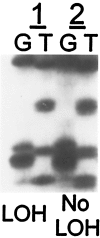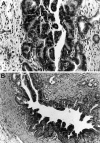BRCA2 is inactivated late in the development of pancreatic intraepithelial neoplasia: evidence and implications - PubMed (original) (raw)
BRCA2 is inactivated late in the development of pancreatic intraepithelial neoplasia: evidence and implications
M Goggins et al. Am J Pathol. 2000 May.
Abstract
Patients harboring germline BRCA2 mutations are at an increased risk of developing pancreatic cancer. We investigated the prevalence of biallelic inactivation of BRCA2 in the presumed precursors to invasive pancreatic ductal carcinomas, pancreatic intraepithelial neoplasia (PanIN). Surgical resection specimens from three patients with germline BRCA2 mutations who developed pancreatic ductal adenocarcinoma were studied. Fourteen PanINs were needle-microdissected from paraffin-embedded tissue. DNA was isolated from these microdissected tissues and amplified by primer-mediated pre-amplification. Loss of heterozygosity at the BRCA2 locus was determined by polymerase chain reaction amplification and cycle sequencing. The presence of the wild-type alleles was evaluated at the nucleotide positions of the germline BRCA2 mutations. The K-ras gene was sequenced at codon 12 and 13 to confirm the efficacy of microdissection. By histological evaluation the prevalence of PanINs in these patients was not notably elevated. Loss of the wild-type allele of BRCA2 was present in one high-grade PanIN (PanIN 3), but in none of 13 low-grade PanINs (PanIN 1). In contrast, K-ras mutations were detectable in 7 of the 14 PanINs. These results suggest that biallelic inactivation of the BRCA2 gene is a relatively late event in pancreatic tumorigenesis. In contrast to classical molecular progression models of tumorigenesis, the inactivation of the wild-type allele in a carrier of a recessive tumor susceptibility gene may not always be the first somatic event during the molecular evolution of a cancer. The necessity for earlier genetic alterations before biallelic inactivation of a recessive tumor susceptibility gene such as BRCA2 may explain why affected carriers have normal numbers of neoplastic precursor lesions, a relatively low phenotypic penetrance, and late age of onset of pancreatic and other cancers.
Figures
Figure 1.
Sequence of the BRCA2 gene upstream of the 2481insT germline mutation in two PanIN lesions from a patient with pancreas cancer (case PX101). The first duct lesion (lane pair 1, PanIN-3) shows the mutant sequence with loss of the wild-type BRCA2 sequence, whereas the second lesion (lane pair 2, PanIN-1) shows the sequence of both the wild-type and mutant alleles (note the double bands for each nucleotide, best seen on comparison of the T lanes). G and T refer to deoxyguanosine and deoxythymidine termination reactions, respectively.
Figure 2.
A: The PanIN-3 duct lesion that harbored LOH of the wild-type BRCA2 gene. B: An example of a PanIN-1 duct lesion from patient PX66 that did not have LOH at BRCA2. Hematoxylin and eosin; original magnification, ×40.
Similar articles
- Germline BRCA2 gene mutations in patients with apparently sporadic pancreatic carcinomas.
Goggins M, Schutte M, Lu J, Moskaluk CA, Weinstein CL, Petersen GM, Yeo CJ, Jackson CE, Lynch HT, Hruban RH, Kern SE. Goggins M, et al. Cancer Res. 1996 Dec 1;56(23):5360-4. Cancer Res. 1996. PMID: 8968085 - Genetic alterations associated with progression from pancreatic intraepithelial neoplasia to invasive pancreatic tumor.
Murphy SJ, Hart SN, Lima JF, Kipp BR, Klebig M, Winters JL, Szabo C, Zhang L, Eckloff BW, Petersen GM, Scherer SE, Gibbs RA, McWilliams RR, Vasmatzis G, Couch FJ. Murphy SJ, et al. Gastroenterology. 2013 Nov;145(5):1098-1109.e1. doi: 10.1053/j.gastro.2013.07.049. Epub 2013 Aug 2. Gastroenterology. 2013. PMID: 23912084 Free PMC article. - Genetic analyses of isolated high-grade pancreatic intraepithelial neoplasia (HG-PanIN) reveal paucity of alterations in TP53 and SMAD4.
Hosoda W, Chianchiano P, Griffin JF, Pittman ME, Brosens LA, Noë M, Yu J, Shindo K, Suenaga M, Rezaee N, Yonescu R, Ning Y, Albores-Saavedra J, Yoshizawa N, Harada K, Yoshizawa A, Hanada K, Yonehara S, Shimizu M, Uehara T, Samra JS, Gill AJ, Wolfgang CL, Goggins MG, Hruban RH, Wood LD. Hosoda W, et al. J Pathol. 2017 May;242(1):16-23. doi: 10.1002/path.4884. Epub 2017 Mar 30. J Pathol. 2017. PMID: 28188630 Free PMC article. - Ductal neoplasia of the pancreas: nosologic, clinicopathologic, and biologic aspects.
Adsay NV, Basturk O, Cheng JD, Andea AA. Adsay NV, et al. Semin Radiat Oncol. 2005 Oct;15(4):254-64. doi: 10.1016/j.semradonc.2005.04.001. Semin Radiat Oncol. 2005. PMID: 16183479 Review. - Molecular genetics of pancreatic intraepithelial neoplasia.
Feldmann G, Beaty R, Hruban RH, Maitra A. Feldmann G, et al. J Hepatobiliary Pancreat Surg. 2007;14(3):224-32. doi: 10.1007/s00534-006-1166-5. Epub 2007 May 29. J Hepatobiliary Pancreat Surg. 2007. PMID: 17520196 Free PMC article. Review.
Cited by
- Evolutionary pathways in BRCA1-associated breast tumors.
Martins FC, De S, Almendro V, Gönen M, Park SY, Blum JL, Herlihy W, Ethington G, Schnitt SJ, Tung N, Garber JE, Fetten K, Michor F, Polyak K. Martins FC, et al. Cancer Discov. 2012 Jun;2(6):503-11. doi: 10.1158/2159-8290.CD-11-0325. Epub 2012 Apr 10. Cancer Discov. 2012. PMID: 22628410 Free PMC article. - Improving the prognosis of pancreatic cancer: insights from epidemiology, genomic alterations, and therapeutic challenges.
Jiang Z, Zheng X, Li M, Liu M. Jiang Z, et al. Front Med. 2023 Dec;17(6):1135-1169. doi: 10.1007/s11684-023-1050-6. Epub 2023 Dec 27. Front Med. 2023. PMID: 38151666 Review. - Telomere shortening is nearly universal in pancreatic intraepithelial neoplasia.
van Heek NT, Meeker AK, Kern SE, Yeo CJ, Lillemoe KD, Cameron JL, Offerhaus GJ, Hicks JL, Wilentz RE, Goggins MG, De Marzo AM, Hruban RH, Maitra A. van Heek NT, et al. Am J Pathol. 2002 Nov;161(5):1541-7. doi: 10.1016/S0002-9440(10)64432-X. Am J Pathol. 2002. PMID: 12414502 Free PMC article. - Expression of S100P and its novel binding partner S100PBPR in early pancreatic cancer.
Dowen SE, Crnogorac-Jurcevic T, Gangeswaran R, Hansen M, Eloranta JJ, Bhakta V, Brentnall TA, Lüttges J, Klöppel G, Lemoine NR. Dowen SE, et al. Am J Pathol. 2005 Jan;166(1):81-92. doi: 10.1016/S0002-9440(10)62234-1. Am J Pathol. 2005. PMID: 15632002 Free PMC article. - Amplification of EMSY gene in a subset of sporadic pancreatic adenocarcinomas.
van Hattem WA, Carvalho R, Li A, Offerhaus GJ, Goggins M. van Hattem WA, et al. Int J Clin Exp Pathol. 2008 Jan 1;1(4):343-51. Int J Clin Exp Pathol. 2008. PMID: 18787609 Free PMC article.
References
- Lynch HT, Smyrk T, Kern SE, Hruban RH, Lightdale CJ, Lemon SJ, Lynch JF, Fusaro LR, Fusaro RM, Ghadirian P: Familial pancreatic cancer: a review. Semin Oncol 1996, 23:251-275 - PubMed
- Lynch HT, Fitzsimmons ML, Smyrk TC, Lanspa SJ, Watson P, McClellan J, Lynch JF: Familial pancreatic cancer: clinicopathologic study of 18 nuclear families. Am J Gastroenterol 1990, 85:54-60 - PubMed
- Hruban RH, Petersen GM, Ha PK, Kern SE: Genetics of pancreatic cancer. From genes to families. Surg Oncol Clin North Am 1998, 7:1-23 - PubMed
- Goggins M, Schutte M, Lu J, Moskaluk CA, Weinstein CL, Petersen GM, Yeo CJ, Jackson CE, Lynch HT, Hruban RH, Kern SE: Germline BRCA2 gene mutations in patients with apparently sporadic pancreatic carcinomas. Cancer Res 1996, 56:5360-5364 - PubMed
- Ozcelik H, Schmocker B, Di Nicola N, Shi XH, Langer B, Moore M, Taylor BR, Narod SA, Darlington G, Andrulis IL, Gallinger S, Redston M: Germline BRCA2 6174delT mutations in Ashkenazi Jewish pancreatic cancer patients. Nat Genet 1997, 16:17-18 - PubMed
Publication types
MeSH terms
Substances
LinkOut - more resources
Full Text Sources
Other Literature Sources
Medical
Miscellaneous

